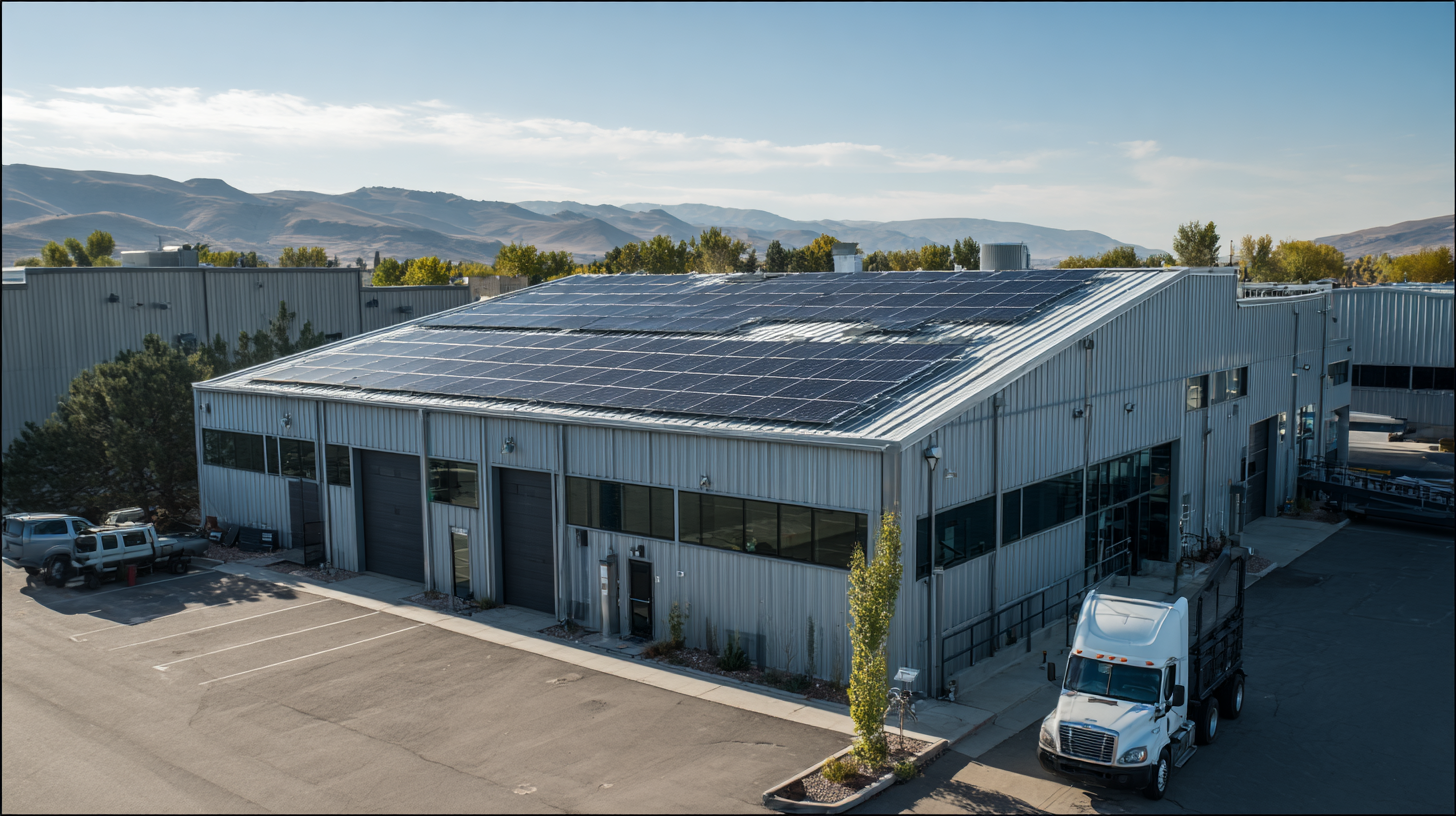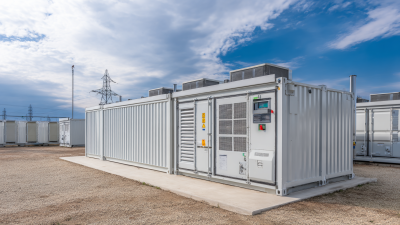In an era where energy efficiency has become paramount for business sustainability, Bess Energy solutions emerge as a pivotal approach for companies aiming to optimize their energy consumption. According to the U.S. Department of Energy, commercial buildings account for about 36% of energy use in the United States, with a significant portion attributable to inefficient energy practices. By implementing advanced energy storage systems like Bess Energy, businesses can not only reduce their operational costs but also contribute to lowering carbon emissions.

Furthermore, a report by the International Energy Agency notes that integrating energy management solutions can yield savings of up to 10-30% on energy bills. This potential for heightened efficiency positions Bess Energy as an indispensable resource for businesses striving to enhance their energy strategies while adhering to regulatory frameworks and sustainability goals.
Through careful planning and execution, Bess Energy solutions can pave the way for a more resilient and energy-efficient future.
Energy efficiency is a critical component of modern business operations, significantly impacting not only the bottom line but also sustainability efforts. According to the U.S. Department of Energy, improving energy efficiency can reduce energy costs for businesses by 10 to 30%. This reduction is increasingly vital as energy rates fluctuate and regulatory pressures for greener practices rise. Implementing efficient systems and technologies can streamline operations and enhance productivity, demonstrating that energy efficiency is not just an operational policy but a strategic business advantage.
Furthermore, a report from the International Energy Agency (IEA) highlights that companies focusing on energy-efficient practices can also enhance their competitiveness in the market. Businesses that invest in energy-efficient technologies are often able to lower their operating costs and amortize these investments through energy savings. For instance, energy efficiency improvements in lighting and HVAC systems can yield up to 50% energy savings compared to traditional systems, showcasing substantial potential for cost savings and environmental benefits. By prioritizing energy-efficient solutions, such as those provided by Bess Energy Solutions, businesses can align their operational practices with both economic and ecological objectives, fostering a sustainable future.
Bess Energy Solutions offer a powerful way for businesses to enhance their energy efficiency. One of the key features of these solutions is their ability to integrate seamlessly with existing energy systems. By utilizing advanced battery storage technology, Bess systems can store excess energy generated during peak production times and release it during high-demand periods. This not only helps to balance energy loads but also reduces reliance on grid power, leading to significant cost savings.
Another benefit of Bess Energy Solutions is their capability for real-time energy monitoring and management. Businesses can track their energy consumption patterns and make informed decisions to optimize usage. This data-driven approach enables companies to identify inefficiencies and implement strategies to reduce energy waste. Furthermore, by embracing these innovative solutions, organizations position themselves as environmentally responsible entities, potentially enhancing their brand image and appeal to eco-conscious consumers.
Assessing your current energy use is the first critical step toward maximizing energy efficiency for your business. A thorough evaluation begins with the implementation of various tools and techniques designed for accurate measurement. Utilizing energy management software can provide real-time insights into consumption patterns, helping businesses identify peak usage times and areas where energy is wasted. Smart meters are another essential tool; they enable companies to track energy usage with precision and facilitate data analysis that can inform strategic decisions.
Additionally, conducting an energy audit is essential for understanding specific energy needs and inefficiencies. Audits can be performed internally or by hiring professional services, and they typically include evaluating lighting, HVAC systems, and other equipment. Through these assessments, businesses can pinpoint opportunities for upgrades or behavioral changes that lead to improved energy efficiency. By leveraging advanced measurement tools and comprehensive audits, organizations can gain valuable insights that not only enhance energy efficiency but can also lead to significant cost savings over time.

Implementing BESS (Battery Energy Storage Systems) solutions is essential for businesses aiming to enhance their energy efficiency. One of the best practices is to conduct a thorough energy audit, evaluating current consumption patterns and identifying peak demand times. By understanding energy usage, businesses can better schedule energy storage and utilization, ensuring that stored energy is used during high-cost periods. This not only reduces expenses but also helps in stabilizing energy flows, leading to operational efficiency.
Another crucial practice is integrating smart technology with BESS. Utilizing advanced energy management systems allows for real-time monitoring and analytics, giving businesses insights into their energy consumption trends. This data-driven approach enables companies to optimize their energy strategy further, adjusting usage based on demand forecasts and storage levels. Additionally, incorporating renewable energy sources, such as solar or wind, into the BESS framework can significantly amplify energy savings, reduce carbon footprints, and promote sustainability within the business model. By adopting these best practices, businesses can truly maximize the potential of BESS solutions for enhanced energy efficiency.
| Energy Solution | Implementation Cost ($) | Annual Savings ($) | Payback Period (Years) | Energy Reduction (%) |
|---|---|---|---|---|
| Battery Energy Storage System | $50,000 | $12,000 | 4.2 | 30% |
| Smart Energy Management Systems | $25,000 | $8,000 | 3.1 | 20% |
| LED Lighting Retrofit | $10,000 | $3,500 | 2.9 | 15% |
| High-Efficiency HVAC Systems | $75,000 | $18,000 | 4.2 | 25% |
| Solar Energy System | $100,000 | $15,000 | 6.7 | 40% |
When evaluating the return on investment (ROI) of energy efficiency solutions for your business, it's important to consider various metrics that not only demonstrate cost savings but also enhance operational productivity. Metrics such as payback period, net present value (NPV), and internal rate of return (IRR) can provide a clear picture of how much your investment in energy solutions will yield over time. By analyzing recent case studies, businesses can see a tangible representation of these metrics at work, showcasing successful energy-saving initiatives.
Tip: Start by tracking your current energy consumption patterns and identify potential areas for improvement. Engaging with vendors that provide real-time energy monitoring can help visualize usage and pinpoint cost centers.

Incorporating tools and software for energy management can simplify the evaluation process. Case studies often reveal that companies utilizing such technologies see not only reduced energy costs but also improvements in operational efficiency. Understanding this connection between energy management and productivity allows businesses to make informed decisions about implementing energy solutions.
Tip: Collaborate with energy specialists to conduct a detailed analysis of your current systems. This approach can highlight hidden inefficiencies and present tailored solutions that optimize both energy consumption and overall business performance.





